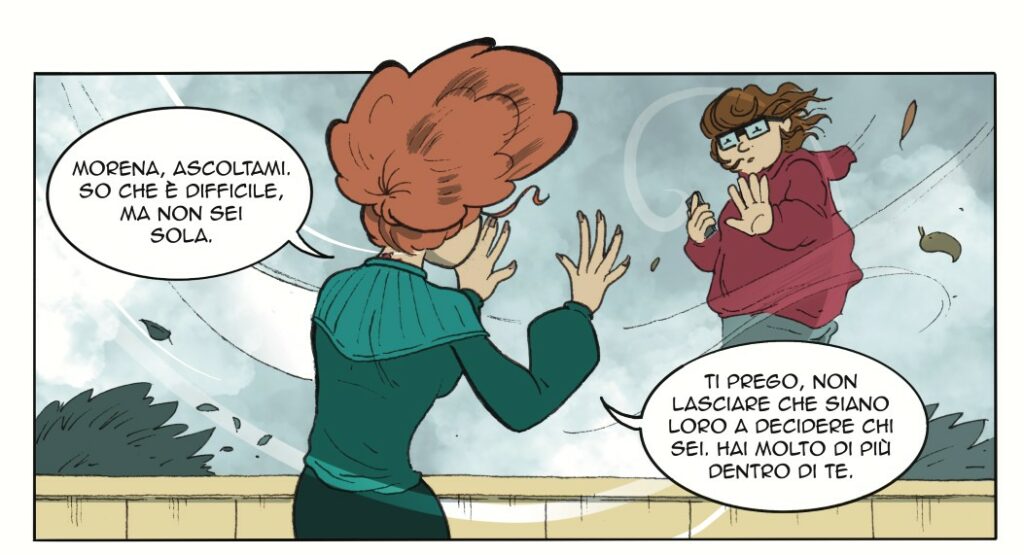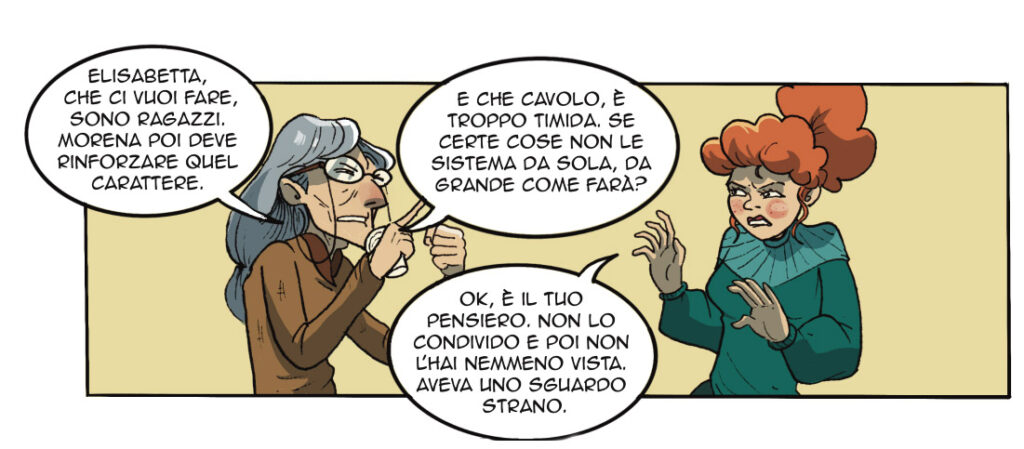
When I decided to write this story of Betti, it was certainly not to make a “nice” or “easy” comic, to read on a sunny afternoon at the beach and to forget the next day. No, it was born from the urgent need to tell a reality that I too have seen, felt and lived, without filters or embellishments.
Of course I am not referring to the reality of digital bullying, but the old-fashioned 70s style, when the “practical people” of a suburban school, with very little sympathy, decided to make me their target for a few laughs. Bullying, digital today, especially in a school, is never a story with a happy ending that resolves with an “And they lived happily ever after”. It is rather a dark labyrinth, where every misstep can mean losing something bigger: dignity, trust and sometimes, unfortunately, even yourself.
The comic “byte the silene” from the Betti-RHC series created and distributed by Red Hot Cyber on Cyberbullying, can be downloaded for free from the website academy.redhotcyber.com.

I wrote this episode of Betti, so, because I believe that fiction, especially pop fiction, has the duty to delve into the darkest folds of reality. And if this reality has peeling walls and noisy corridors, then it’s better to dive into it without filters. The story unfolds, of course, in that emblematic place that is the school, located, for narrative needs, on the outskirts of Rome. But don’t worry, principals of other cities: don’t point the finger at the Capital, which I’m sure is not missing from yours either!
The building is almost a character in itself, with its worn desks and that dust that seems encrusted on the souls of the students. But what is truly disturbing is not the school itself, it is the atmosphere. That tension that can be felt between the fleeting glances, the whispered voices and the heavy silence that tells stories never told, but felt by everyone. Betti arrives as a substitute math teacher. But he doesn’t stop at the surface. He sees something that other teachers fail to notice, Morena, a fragile and invisible girl, the perfect victim of bullying that moves in the shadows and on the pages of Instagram. “The Whale Girl”: a toxic label fueled by manipulated images, distorted videos, poisonous comments. A digital nightmare that doesn’t turn off when you leave school.
Betti is not just a character. He is someone who has chosen not to look the other way (and, fortunately, there are plenty of Bettis) in that somewhat forgotten suburb, where the real monsters hide: not just the kids who bully, but a system that uses them to carry out blackmail, manipulation and create silences too heavy to be ignored. In this story, bullying is not just made up of slaps or pushes, but above all of pixels and “likes” that can become sharp weapons. The anonymous Instagram profile that humiliates Morena, the 200 “likes” that transform suffering into a public spectacle, are proof that technology can amplify evil, make it viral, uncontrollable.

I won’t lie to you: when I wrote about Morena on the terrace, ready to disappear into the void, I stopped to think. And perhaps you too, reading, found yourself touching that thought, that fragile moment in which everything seems too heavy to bear. Or, you may have happened to meet that dull gaze, and silently ask yourself: “What can I do?”. This is the question I tried to include in every vignette. Not because I have the solution (who does, after all?), but because we cannot afford to ignore those stories, not even in the most invisible folds of our society.
The comic does something powerful: it shows that digital bullying is not always just a problem of reckless teenagers. Behind it there is a dark “big brother” who acts as a puppeteer; there is the complicity of silence and there is the fear that keeps the kids trapped like in a spider’s web. This is the most disturbing part, but also the most real. Behind bullying there is always something bigger, a network of fear, blackmail, silence. It is not enough to “report” or “block” a profile. The problem is systemic, and in Betti we tell it without mincing words.
And then there is the human side, at times fragile, at times surprising. A boy who, after walking on the edge of the abyss, chooses to tell his truth in front of an entire school and a girl who stands up and, without screaming, restores dignity to those who thought they were invisible. These are moments that make you understand that even in the darkest situations you can find a spark, a chance for redemption. If you are still asking yourself “But why download and read this comic?” the answer is simple: because you cannot afford to ignore the monster that hides behind a screen. Because this is not a comic for children or for those who are just looking for entertainment. It’s a punch in the stomach that makes you think, smile bitterly and, perhaps, act.
And I’ll tell you one last thing, with a bit of irony that my role as screenwriter allows me: if you think that turning off your phone is enough to be safe, well, Betti will make you think again. Because the shadow of the older brother is still there, within the peeling walls of the school, ready to knock on anyone’s door. So, if you just want a light read, move on. But if you want to get involved, if you want to understand how digital has transformed bullying into something more insidious, then this Betti is the comic you need to read. Ultimately, I believe that true freedom, the one we tell ourselves about in novels and films, also comes from here: from stories like Betti that remind us that we can never stop looking, listening, fighting.
Because in the digital world, as in life, indifference is the worst enemy. The reader has only one choice: to look or to turn away. Luckily, I chose the first, but perhaps it is easier for me because I always have a powerful weapon with me: the pen.
ps. By the way, the old “practical people” I was telling you about didn’t do so well…
Follow us on Google News to receive daily updates on cybersecurity. Contact us if you would like to report news, insights or content for publication.
